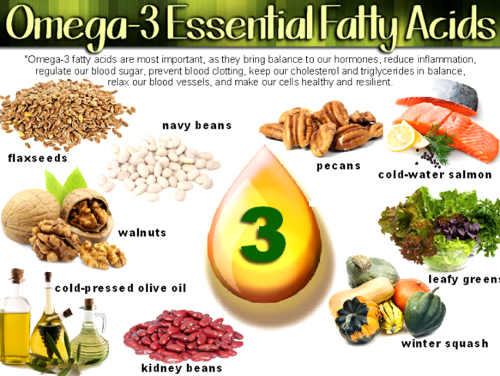Benefits of Omega-3 Fatty Acids Omega-3 Deficiency Symptoms Omega-3 Fatty Acid Capsules Sources of Omega-3 Fatty Acids Omega-3 Deficiency Diseases Omega-3 Fatty Acid Foods Benefits and Disadvantages of Omega 3 Capsules.
Omega-3 fatty acids are an important nutrient in maintaining health. They contain three main types of omega-3 fatty acids: alpha-linolenic acid (ALA), eicosatetraenoic acid (EPA) and docosahexaenoic acid (DHA). Omega-3 fatty acids are commonly found in certain types of fish, plant oils and nutritional remedies. Here are the uses, feedback and other details of Omega-3:
👉1st Phorm Protein Recipes: Benefits and Side effects
Omega-3 fatty acids are found in

Omega-3 fatty acids are found in a variety of food sources, including the following:
- Fatty fishes: Fatty fishes are one of the richest sources of omega-3 fatty acids. Some examples of fish with high levels of omega-3 are:
- Flaxseeds and Chia Seeds: Flaxseeds and chia seeds are sources of plant-derived omega-3 fatty acids, specifically alpha-linolenic acid (ALA).
- Walnuts: Walnuts are another plant source of ALA, making them a good alternative for people who don’t eat fish.
- Canola oil: Canola oil contains a moderate amount of ALA and can be used as a cooking oil or added to salad dressings.
- Soybeans and Tofu: Soybeans and tofu are plant sources of ALA and can be included in vegetarian and vegan diets.
- Cod liver oil: Cod liver oil is a supplement derived from the liver of codfish, and is a concentrated source of EPA and DHA.
- Krill oil: Krill oil is another supplement that is a source of EPA and DHA and is made from tiny shrimp called krill.
- Hemp seeds: Hemp seeds contain small amounts of ALA and can be added to smoothies, salads or oatmeal.
- Brussels sprouts: Brussels sprouts contain small amounts of ALA and may contribute to the normal intake of omega-3s.
It is important to eat a balanced diet that includes a variety of omega-3 sources to ensure adequate absorption of these essential fatty acids. For individuals who have difficulty getting enough omega-3s from their diet, omega-3 supplements (such as fish oil or branched supplements for vegetarians/vegans) may be considered under the guidance of a medical professional. ”
👉Health Benefits and Side Effects of Olive Oil
uses of omega 3 fatty acids

Heart health: Omega-3 fatty acids have benefits for heart health, such as lowering triglycerides (a type of fat in the blood), lowering blood pressure, and reducing the risk of heart disease.
Brain health: DHA is a major structural component of the brain and plays an important role in brain development and function. Consuming adequate amounts of omega-3 fatty acids has been linked to improved cognitive function of the brain and reduced risk of cognitive decline.
Eye health: DHA is also a component of the retina, and getting adequate amounts of omega-3 fatty acids may help maintain good eye health and reduce the risk of age-related macular degeneration.
Inflammation and autoimmune disorders: Omega-3 fatty acids have anti-inflammatory properties, and may help reduce inflammation associated with rheumatoid arthritis and other autoimmune diseases.
Mental health: Some studies suggest that omega-3 fatty acids can have a positive effect on mood and help manage depression and anxiety.
👉Flaxseed Benefits and Side Effects In English
Omega-3 fatty acid side effects Omega 3 fish oil side effects

Omega-3 fatty acids are generally considered safe when taken in recommended amounts. However, some people may experience minor side effects, which may include:
Fishy odor: Some fish oil nutritional treatments can produce an odor, which may be bothersome to some individuals.
Digestive problems: Consuming high amounts of omega-3s can cause digestive discomfort, such as diarrhea.
Bleeding: Omega-3 fatty acids have a mild blood-thinning effect, which may increase the risk of bleeding, especially if you are taking blood-thinning medications. It is important to consult your health care professional to avoid possible side effects on such drugs.
Potential to interact: Omega-3 fatty acid supplements have the potential to interact with supplements, such as anticoagulant, antiplatelet medications, and some diabetes and high blood pressure medications. Always inform your health care provider about all your supplements to avoid possible side effects.
👉Unique soft board border decoration for school (16 Ideas)
What are the symptoms of omega 3 deficiency?

Omega-3 fatty acids are essential nutrients, meaning that our bodies cannot make them and we must obtain them from our diet. Deficiency of omega-3 fatty acids can lead to various health problems. Here are some common symptoms of omega-3 deficiency:
Dry and scaly skin: An early sign of omega-3 deficiency can be dry, scaly or itchy skin. Omega-3s play an important role in maintaining skin health and hydration.
Decreased attention and memory: Omega-3 fatty acids, especially DHA, are essential for brain health and cognitive ability. Deficiencies can lead to problems concentrating, memory problems, and decreased cognitive performance.
Fatigue and low energy levels: Omega-3s are involved in energy production and the recommended lifespan. Adequate consumption may result in feelings of fatigue, low energy levels, and abnormal physical activity.
Joint pain and stiffness: Omega-3s have anti-inflammatory properties, and increased inflammation in the joints due to a deficiency can lead to joint pain and stiffness, especially in conditions such as arthritis.
Altered mood swings and depression: Omega-3 fatty acids are associated with improved mood and mental well-being. Deficiency can lead to mood changes, irritability, and an increased risk of depression.
Dry eyes: Omega-3s are beneficial for eye health, and a deficiency may increase the risk of dry eyes and age-related vision loss.
Decreased heart health: Omega-3 fatty acids play important roles in heart health, including lowering triglycerides, lowering blood pressure,
What are the benefits of omega 3 fatty acids? omega 3 fish oil benefits
“Omega-3 fatty acids provide a vast array of health benefits because of their essential role in various bodily processes. There are three major types of omega-3 fatty acids: alpha-linolenic acid (ALA), eicosapentaenoic acid (EPA) and docosahexaenoic acid (DHA). Here are some of the major benefits of omega-3 fatty acids:
Omega-3 Fatty Acids for the Heart: Omega-3 fatty acids are well known for their positive effects on heart health. Consuming these can help reduce triglyceride levels, lower blood pressure, and improve overall heart function. Regular consumption of omega-3 fatty acids has been linked to a reduced risk of heart disease and stroke.
Omega-3 fatty acids for the brain: DHA, in particular, is a key structural component of the brain and plays an important role in brain development and function. Omega-3 fatty acids are believed to support brain health and may help improve memory, focus, and concentration.
Omega-3 fatty acids for the eyes DHA is a component of the lining of the eye. Consuming omega-3 fatty acids is associated with a lower risk of age-related vision loss, a common cause of vision loss and blindness in older adults.
Omega-3 fatty acids to reduce inflammation in the body: Omega-3 fatty acids have anti-inflammatory properties, which help reduce inflammation in the body. This reshma is beneficial for individuals with arthritis and other autoimmune disorders.
Omega-3 fatty acids for the brain: Some studies suggest that omega-3 fatty acids may have positive effects on psychotherapy and mental health. It can help reduce the symptoms of psychosis and anxiety and promote overall emotional well-being.
Omega-3 Fatty Acids for the Skin: Omega-3 fatty acids play a role in keeping the skin healthy, by supporting hydration, reducing inflammation, and helping to protect against sun damage.
Omega-3 fatty acids for pregnancy and infant development: Adequate intake of omega-3 fatty acids during pregnancy is essential for healthy development of the baby’s brain and eyes. It may help reduce the risk of preterm delivery and support neurological development in the baby.
Omega-3 Fatty Acids for Joints Omega-3 fatty acids may help reduce joint stiffness and improve joint function in individuals with arthritis and other joint problems.
Omega-3 fatty acids for bones: Some research suggests that omega-3 fatty acids may help improve bone density and reduce the risk of osteoporosis.
Omega-3 fatty acids for asthma: Omega-3 fatty acids may have a positive effect on lung function and may help reduce symptoms in individuals with asthma.
It is important to note that while omega-3 fatty acids provide many health benefits, they are not a substitute for proper medical treatment. It is always good to consult a healthcare professional before making any significant changes to your diet or supplements, especially for health conditions or concerns.”
Note: It is important that you consult with your health care provider before starting any new supplement, especially if you have any pre-existing health conditions or are taking any medications.
Omega-3 fatty acids are found naturally in some foods, such as fatty fish (salmon, mackerel, sardines), flaxseeds, chia seeds, walnuts, and canola oil. If you choose to take an omega-3 supplement, consider choosing high-quality products from reputable manufacturers.
Benefits of Omega-3 Fatty Acids Omega-3 Deficiency Symptoms Omega-3 Fatty Acid Capsules Sources of Omega-3 Fatty Acids Omega-3 Deficiency Diseases Omega-3 Fatty Acid Foods Benefits and Disadvantages of Omega 3 Capsules
FAQ’s
What are the symptoms of omega-3 fatty acid deficiency?
- Dry skin
- Poor vision
- Slow growth
- Fatigue
- Depression
- Mood swings
- Joint pain
- Heart problems
What are the benefits of omega-3 fatty acids?
- Heart health
- Brain health
- Eye health
- Joint health
- Skin health
- Mood health
- Immune system health
- Pregnancy health
What are the uses of omega-3 fatty acids?
- Supplements
- Food sources (fish, nuts, seeds)
- Medications (for some conditions)
What are the side effects of omega-3 fatty acids?
- Mild indigestion
- Increased bleeding risk
- Interaction with certain medications
How much omega-3 fatty acids do I need?
The recommended daily intake of omega-3 fatty acids varies depending on age, sex, and other factors. However, most adults should aim for at least 250-500 mg of EPA and DHA per day.
Last words:
If you enjoyed this post, or if you learned something new, please share it with your friends and followers on social media. You can share it on WhatsApp, Facebook, Instagram, Telegram, Pinterest, Twitter, Google NEWS, Google+, and other social media sites. You can also subscribe to my YouTube channel.

